| | | | | | | Presented By GLOBAL X ETFS | | | | Axios World | | By Dave Lawler · Dec 05, 2022 | | Welcome back to Axios World. - Tonight's edition (1,938 words, 7 minutes) starts with an interview on the EU's shifting stance on China, looks at the scandal engulfing South Africa's president, and examines today's strikes deep in Russian territory.
New arrival? Subscribe. | | | | | | 1 big thing: EU, U.S. views on China threat converge | 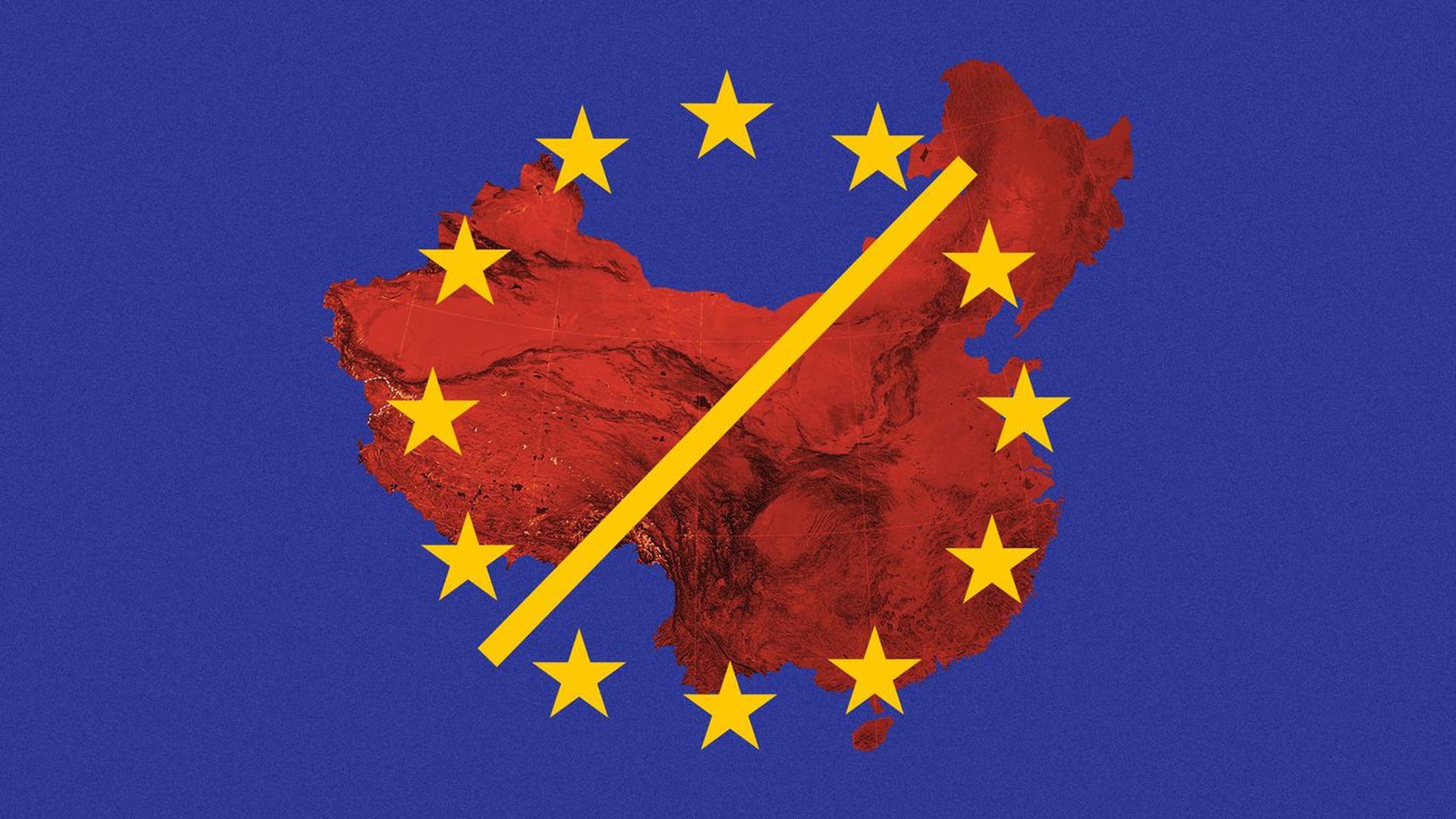 | | | Illustration: Lindsey Bailey/Axios | | | | The EU and U.S. positions on China have converged, due in part to Beijing's growing assertiveness and burgeoning partnership with Russia, Stefano Sannino, secretary-general of the EU's foreign policy arm, told Axios in an interview. Why it matters: The EU declared Beijing a "systemic rival" in 2019, but European leaders have been slower than their U.S. counterparts to shift their focus from economic opportunities to security concerns. Today, however, Sannino said, Brussels and Washington have reached a common assessment of the challenges posed by China — though not always a shared approach to addressing them. Driving the news: One factor pushing the U.S. and EU closer together has been China's "new friendship" with Russia, particularly since the invasion of Ukraine, Sannino said. - "We have in front of us a different world compared with what we had one year ago," Sannino said. "We do not have all the elements of the new equation, but certainly it's something that is changing, somehow, the landscape."
- Sannino said the China-Russia nexus was a primary focus of the fourth high-level U.S.-EU Dialogue on China on Thursday and Friday, which the veteran Italian diplomat led alongside Deputy Secretary of State Wendy Sherman.
Flashback: For years, the EU's focus in dealing with China was on maintaining a level playing field for European companies, Sannino said. - "Now it has become much broader," due in part to the growing assertiveness of Chinese leaders who have made clear they want to reshape the world order to suit their interests, Sannino said.
- The EU is attempting to reduce reliance on China in areas ranging from rare-earth minerals to 5G infrastructure. After last week's talks, the U.S. and EU also released a joint statement raising concerns about China's human rights abuses, "provocations" toward Taiwan, and "economic coercion."
State of play: EU leaders have also raised concerns about the idea of "decoupling" from China, or getting caught up in a U.S.-China confrontation. - Meanwhile, the Biden administration's efforts to cut China off from advanced semiconductor technology and boost U.S. industry to compete with China have created tensions with Europe.
- Sannino warned against responses to China that were also "discriminatory" toward the EU — an allusion to U.S. subsidies under the Inflation Reduction Act that don't apply to EU firms — and said "the jury is still out" on President Biden's export controls on semiconductor exports to China.
- Still, Sannino said after last week's talks that the U.S. and EU are increasingly speaking the same language on China, and that "there was no kind of pressure to take a certain decision, to say yes or no, with us or not with us."
- Yes, but: The U.S. is reportedly pressuring the Netherlands — home to the world's leading producer of chipmaking tools, ASML — to go along with its export controls.
The big picture: Sannino spoke to Axios shortly after European Council President Charles Michel met Chinese President Xi Jinping in Beijing. German Chancellor Olaf Scholz also recently visited Beijing, and French President Emmanuel Macron intends to go early next year. - The intense criticism Scholz faced at home for traveling to Beijing with a delegation of business leaders underscored the growing skepticism toward an economy-first approach to China.
- However, EU-China trade hit a record high last year, and is increasingly important at a time when Europe is facing severe economic headwinds.
- The other side: Xi has urged the EU to view China "independently," rather than going along with U.S. policy.
The bottom line: "The point here is not ostracizing China," Sannino told Axios. Brussels has to strike the right balance, he said, "not to be nasty, but not to be naive." |     | | | | | | 2. South Africa's Ramaphosa may avoid impeachment | 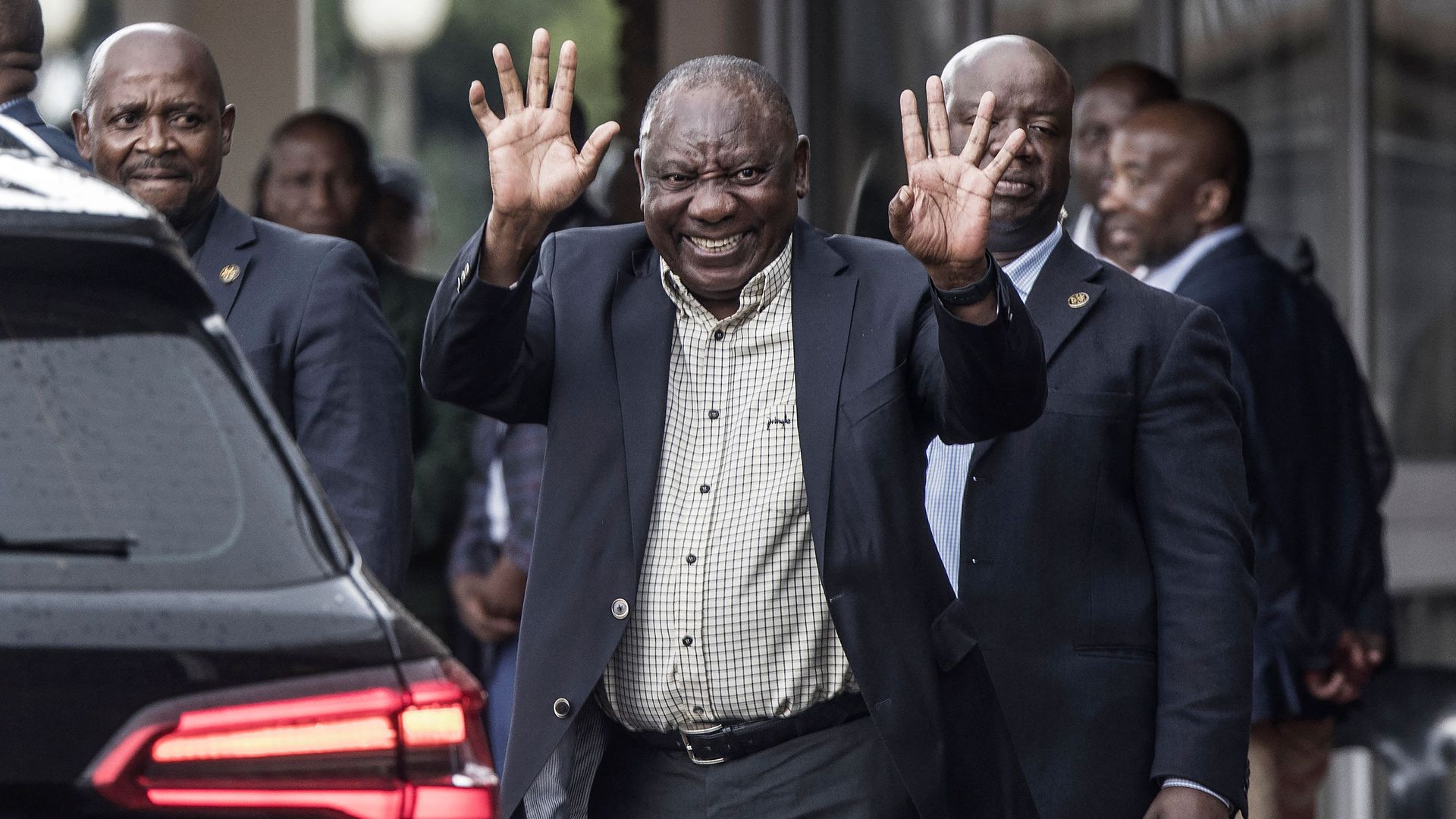 | | | President Cyril Ramaphosa today. Photo: Marco Longari/AFP via Getty Images | | | | The executive committee of South Africa's ruling party, the African National Congress (ANC), decided to stand by President Cyril Ramaphosa following emergency meetings today, after an independent panel had recommended he face an impeachment inquiry over the "Farmgate" scandal. Why it matters: Ramaphosa made up his mind to resign last Thursday before his allies convinced him to fight it out, the Mail and Guardian reports. He now seems likely to avoid impeachment, but he'll still have to navigate additional investigations and convince his fractured party to re-elect him as its leader at a nominating conference in two weeks. How it happened: It emerged in June that in 2020 burglars allegedly stole a huge sum of cash that had been stuffed into a couch at Ramaphosa's private ranch. - That raised questions about where Ramaphosa got the money (he says it came from selling buffalo and was far less than the $4 million originally reported), why it was hidden in a couch, why it hadn't been declared, and why instead of reporting the theft he reportedly sent members of his security detail to track down the perpetrators.
- The panel tasked with investigating the matter did not find Ramaphosa's explanations satisfactory, but ANC leaders instructed their lawmakers today to vote against impeachment.
- Ramaphosa also asked the constitutional court to dismiss the report.
The big picture: Ramaphosa, a former confidante of Nelson Mandela who made a fortune in business before returning to politics, had been seen as a reformer in a party tainted by corruption scandals, and as the ANC's best chance of reversing its downward political slide ahead of the 2024 election. |     | | | | | | 3. Russia responds to oil price cap, air base strikes | 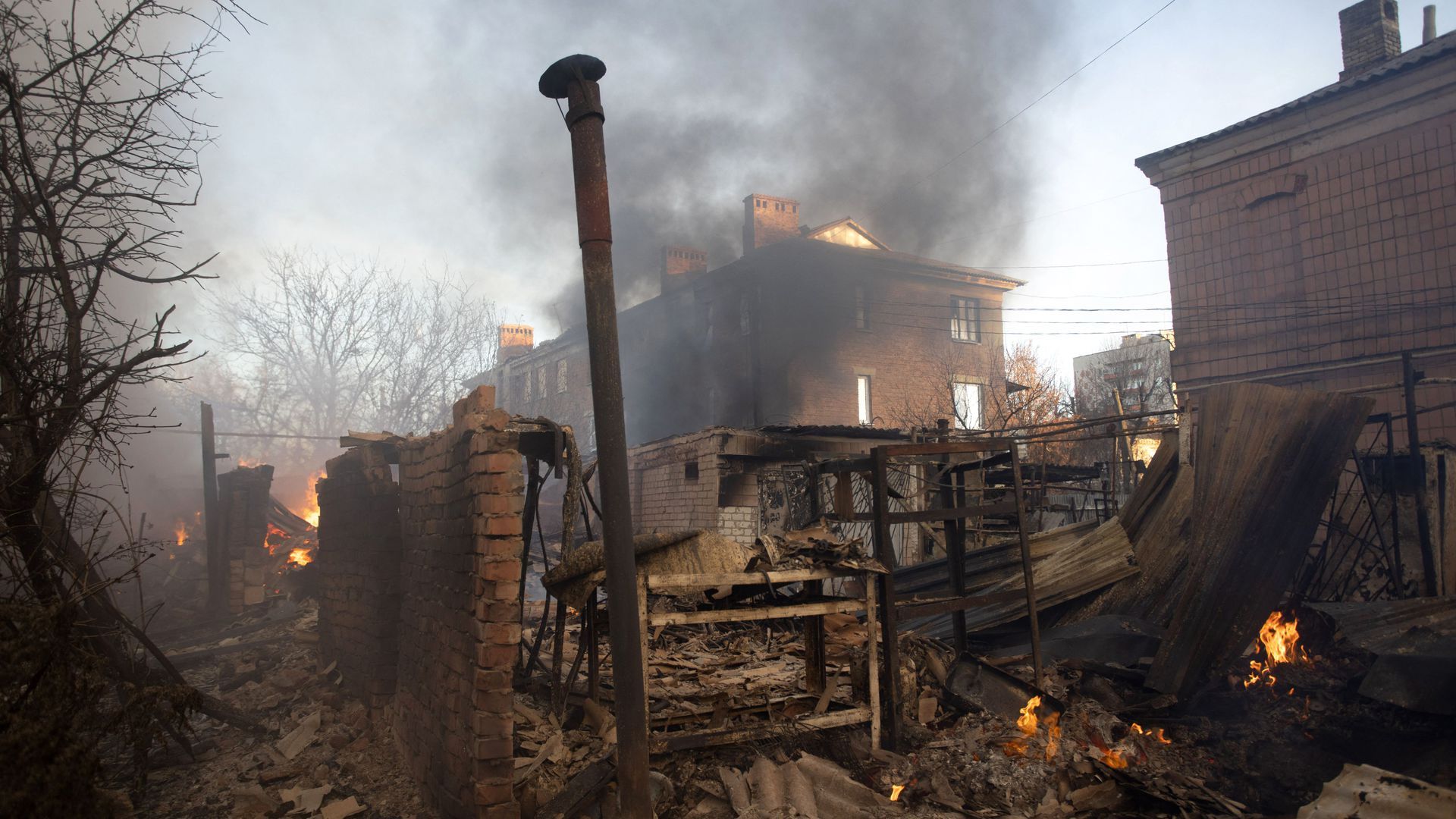 | | | A building burns after shelling in Bakhmut, Donetsk region, on Dec. 4. Photo: Yevhen Titov/AFP via Getty Images | | | | A G7 plan to cap the price of Russian oil at $60 per barrel and an EU ban on seaborne shipments of Russian crude both officially went into effect today. - The cap allows those importing Russian oil to take advantage of Western shipping, financing and insurance, only if they pay at or below the $60 price, my Axios Macro colleagues write.
Why it matters: The goal is to reduce Russia's ability to fund its war effort with bumper oil profits. But Ukraine says the cap is far too high and implementation will be complicated. Russia says it would rather slash its output than comply, which would cause global prices to rise. - No one really knows how this will work, including OPEC+, which decided to keep production steady for now.
Meanwhile, Russia launched a fresh wave of missile strikes across Ukraine today, continuing attacks on critical infrastructure as the war stretches into winter, Axios' Ivana Saric reports. - In Odesa, a missile strike left the city without water after cutting the power supply to pumping stations, AP reported.
Across the border, two Russian air bases were struck today, with Russia's Defense Ministry blaming Ukrainian drones. - The bases are more than 300 miles into Russian territory, and one has been a key base for Russian air and missile strikes into Ukraine, per WSJ.
- Ukrainian officials did not immediately claim credit. But Mykhailo Podolyak, an adviser to President Volodymyr Zelensky, tweeted that "sooner or later unknown flying objects will return to departure point."
|     | | | | | | A message from GLOBAL X ETFS | | Potential investing opportunities from the Inflation Reduction Act | | | 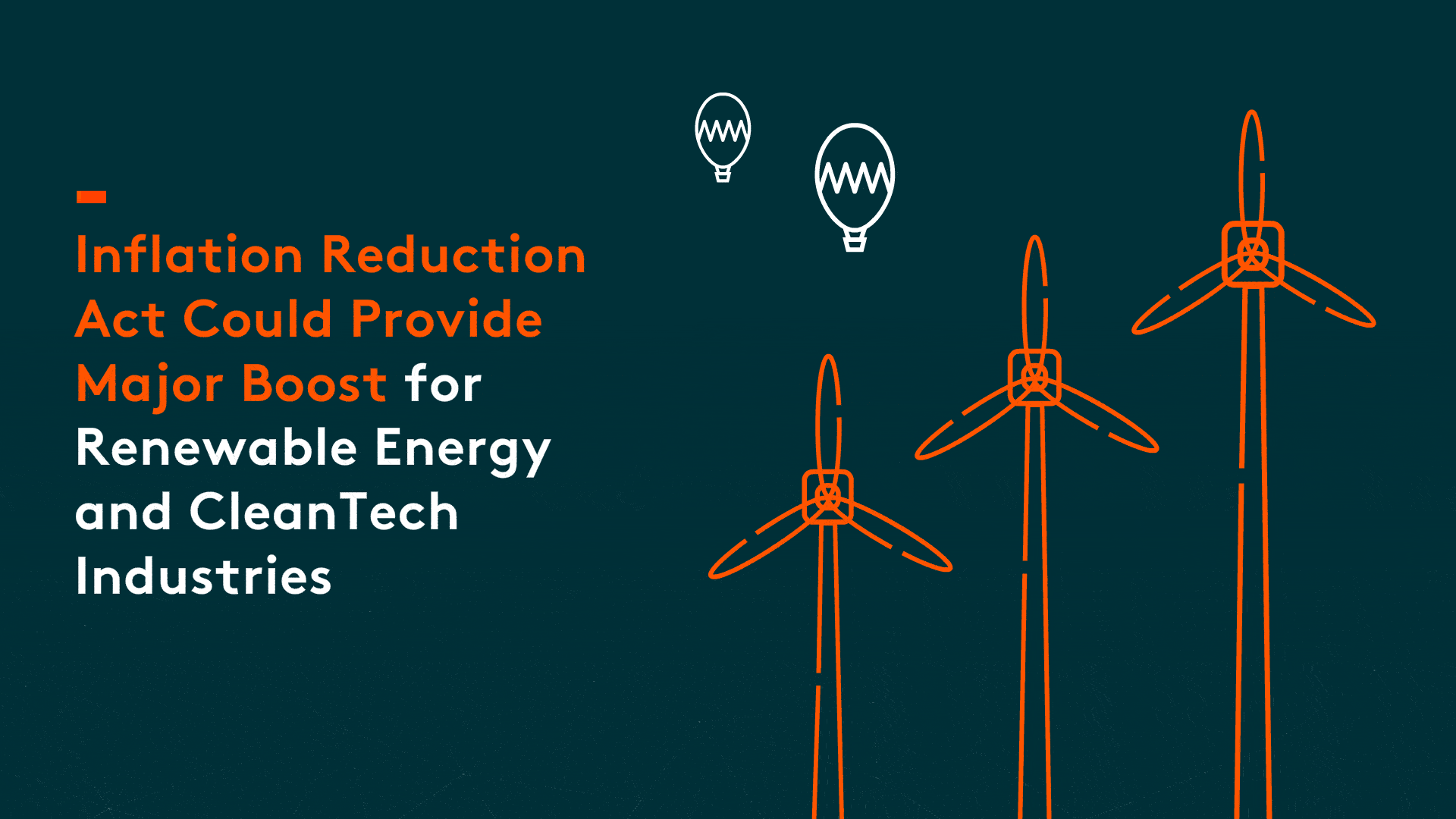 | | | | Recently, the landmark Inflation Reduction Act was signed into law, directing hundreds of billions in funds to advance climate and green energy priorities. Explore potential investing opportunities and other takeaways in our full breakdown of the law's funding priorities. Learn more. | | | | | | Bonus: Where in the world? | 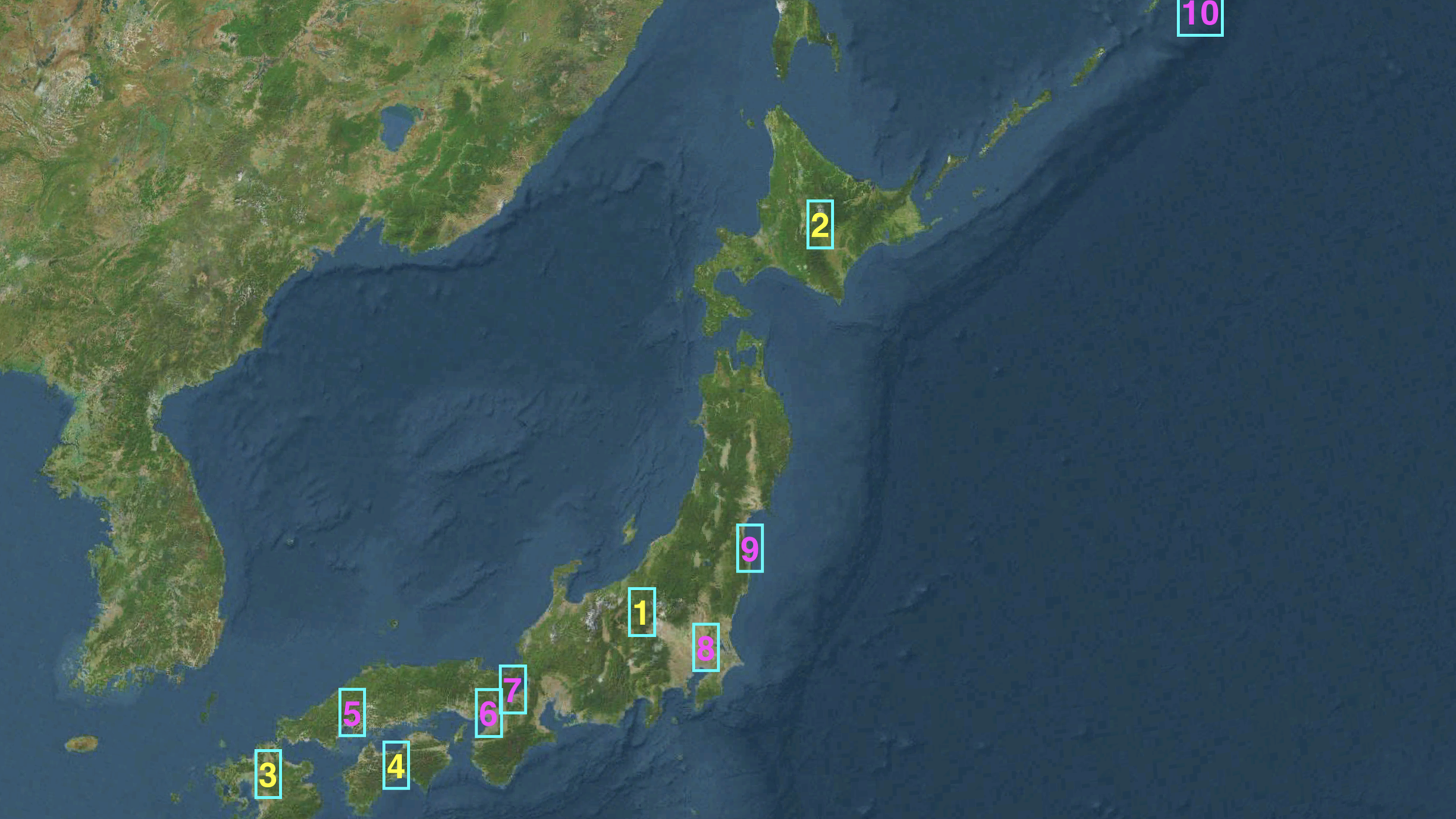 | | | Screengrab via Apple Maps | | | | Today, we're paying a visit to Japan. Can you name all 10 islands and cities? 1. Japan's largest and most populous island 2. Japan's northernmost island, home to ski resorts and the city of Sapporo 3. Japan's third most populous island, home to hot springs and the city of Fukuoka 4. The smallest of Japan's four major islands, known for its Buddhist temples and udon noodles 5. The first city ever attacked with a nuclear bomb, since rebuilt into a major city 6. Japan's second city, and a major financial and culinary center 7. A former imperial capital, now a major tourism hub for its shrines and temples 8. The capital 9. Prefecture where the 2011 nuclear disaster took place 10. Islands claimed by both Japan and Russia (they are farther north than shown here). Scroll to the bottom for answers. |     | | | | | | 4. Global news roundup |  | | | Taking the subway in Zhengzhou, China, which no longer requires a negative test. Photo: VCG via Getty Images | | | | 1. Chinese cities are easing enforcement of COVID restrictions following the recent protests, though no nationwide policy shift has been officially announced. 2. Sudan's generals signed a deal today to establish a new civilian-led transitional government more than a year after taking power in a coup, though the agreement is vague and was rejected by some major pro-democracy groups. 3. Shops in several Iranian cities remained closed today as part of a three-day strike announced by protesters. 4. Protesters in the Syrian city of Sweida set fire to the governor's residence on Sunday and called for Bashar al-Assad to resign. Sweida remained calm relative to the rest of Syria during the civil war, but has been suffering from dire economic conditions along with the rest of the country. 5. West African leaders agreed Sunday to form a new regional peacekeeping force to counter extremist groups and help "restore constitutional order" in a region beset by coups. Details are scarce for now. 6. U.S. national security adviser Jake Sullivan met Brazilian President-elect Luiz Inácio Lula da Silva today and extended an invitation from President Biden to visit the White House after he takes office. |     | | | | | | 5. In China, a waning thirst for wine | | Data: OIV Database; Chart: Axios Visuals Chinese wine consumption last year was the lowest since 1997, when China's GDP was one-twentieth of its 2021 size, Axios' Felix Salmon writes. Why it matters: Until 2013, China was considered the inevitable home of the future wine market. That now looks much less likely. |     | | | | | | 6. World Cup roundup | 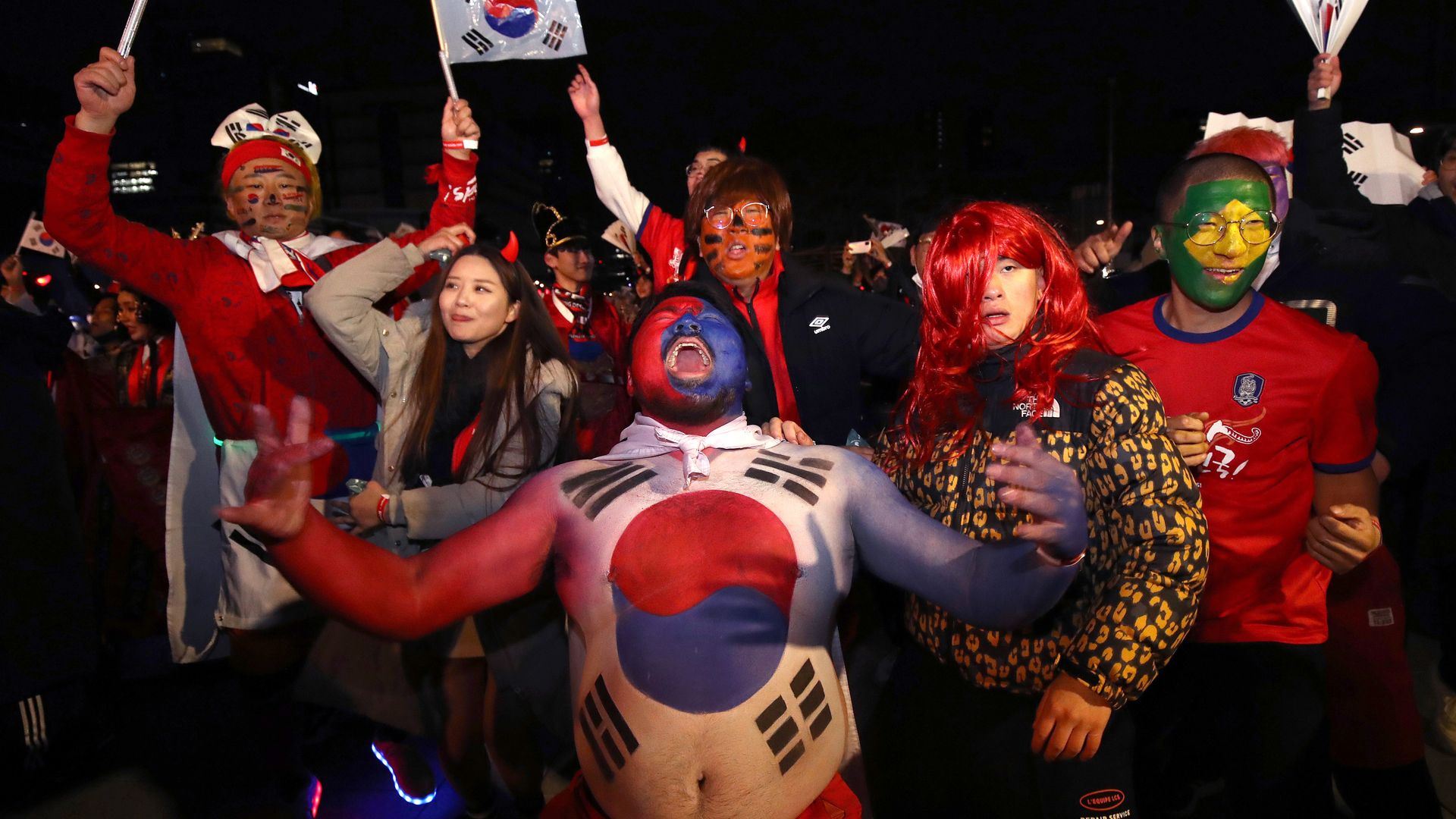 | | | Fans gather in Seoul ahead of a match that ultimately didn't give them much to yell about. Photo: Chung Sung-Jun/Getty Images | | | | Japan fell to Croatia on penalties today, while South Korea lost 4-1 to an irrepressible Brazil side that looks like a good bet to return the trophy to South America after a 20-year drought. - Only two Asian teams have ever reached the quarterfinals: South Korea on home soil in 2002 and North Korea during a stunning run in 1966.
- If Morocco upsets Spain tomorrow it will become the fourth African team to reach the last eight, and the first since 2010. Otherwise, we'll be down to the Europeans and South Americans yet again.
- Four heavyweights — Argentina, England, France and the Netherlands — advanced over the weekend. The last spot will go to the winner of Portugal vs. Switzerland.
What I'm reading... In the New Yorker, Sam Knight explores "the contradiction between Qatar's international posturing and its cultural conservativism, which many Qataris regard as a deeply precious thing." - One young Qatari named Ali says his parents worried ahead of time, "What if people don't leave —they come here for the World Cup and just, like, start selling drugs or doing whatever?"
- A soccer-loving Qatari named Asma says she finds the Western criticism frustrating and hypocritical. Meanwhile, Westerners "love Dubai... but they don't care about the people who build Burj Khalifa," she says, referring to the world's tallest building.
- Qatar is also growing, fast. "The World Cup cost more than two hundred billion dollars... but the price tag included the metro system, an airport extension, bridges, man-made islands, fighter jets, a collapsible stadium, and a bulk order of five-star hotels. Doha tripled in size during the twenty-tens."
Meanwhile, WaPo's Ishaan Tharoor notes that with cheaper flights and fewer visa restrictions, the Qatar World Cup is more accessible to fans from Africa and parts of Asia than the 2026 iteration in the U.S. is likely to be. |     | | | | | | 7. Stories we're watching | 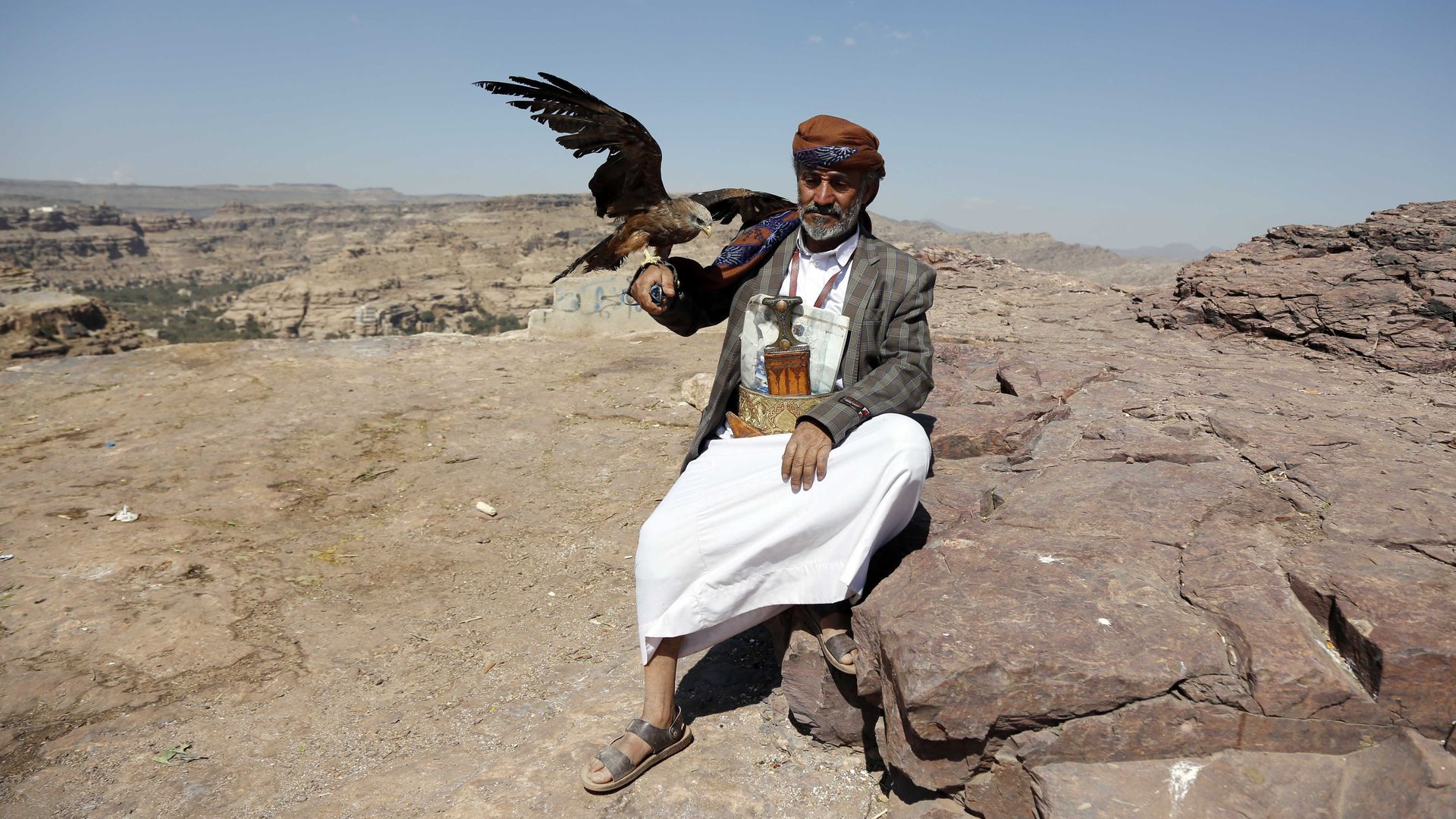 | | | A man and his hawk at Wadi Dhar in Sana'a, Yemen. Photo: Mohammed Hamoud/Anadolu Agency via Getty Images | | | - Indonesia volcano eruption prompts evacuations
- Fraud charges against Huawei CFO dismissed
- Pivotal test for World Bank bond guarantees
- Middle East IPO train keeps rolling
- Ukraine embassies receive bloody packages
- Blinken: U.S. to deal with Israel based on policies, not "personalities"
- 2,500 dead seals found on Russian coastline
Quoted: "One of the essential points we must address, as President Putin has always said, is the fear that Nato comes right up to its doors. .... We need to prepare what we are ready to do, how we protect our allies and member states, and how to give guarantees to Russia the day it returns to the negotiating table." — French President Emmanuel Macron yesterday. As you might guess, Ukraine and its most vocal backers were not happy with the idea of security guarantees for Russia being a top priority. |     | | | | | | A message from GLOBAL X ETFS | | Potential investing opportunities from the Inflation Reduction Act | | | 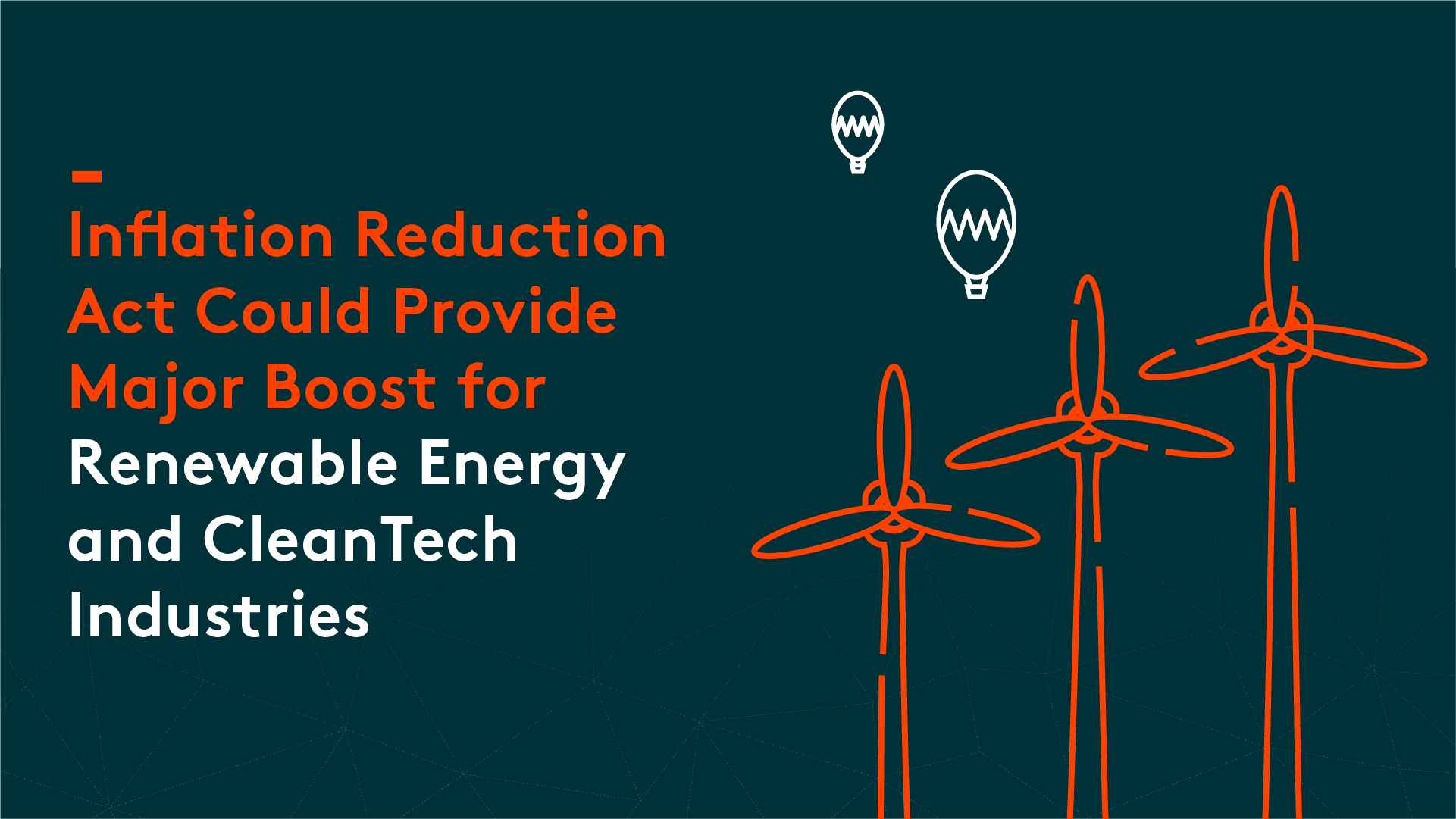 | | | | Recently, the landmark Inflation Reduction Act was signed into law, directing hundreds of billions in funds to advance climate and green energy priorities. Explore potential investing opportunities and other takeaways in our full breakdown of the law's funding priorities. Learn more. | | | | Answers: 1. Honshu; 2. Hokkaido; 3. Kyushu; 4. Shikoku; 5. Hiroshima; 6. Osaka; 7. Kyoto; 8. Tokyo; 9. Fukushima; 10. Kuril Islands. |  | | Are you a fan of this email format? Your essential communications — to staff, clients and other stakeholders — can have the same style. Axios HQ, a powerful platform, will help you do it. | | | | | | Axios thanks our partners for supporting our newsletters. If you're interested in advertising, learn more here.
Sponsorship has no influence on editorial content. Axios, 3100 Clarendon Blvd, Arlington VA 22201 | | | You received this email because you signed up for newsletters from Axios.
Change your preferences or unsubscribe here. | | | Was this email forwarded to you?
Sign up now to get Axios in your inbox. | | | | Follow Axios on social media:    | | | | | |








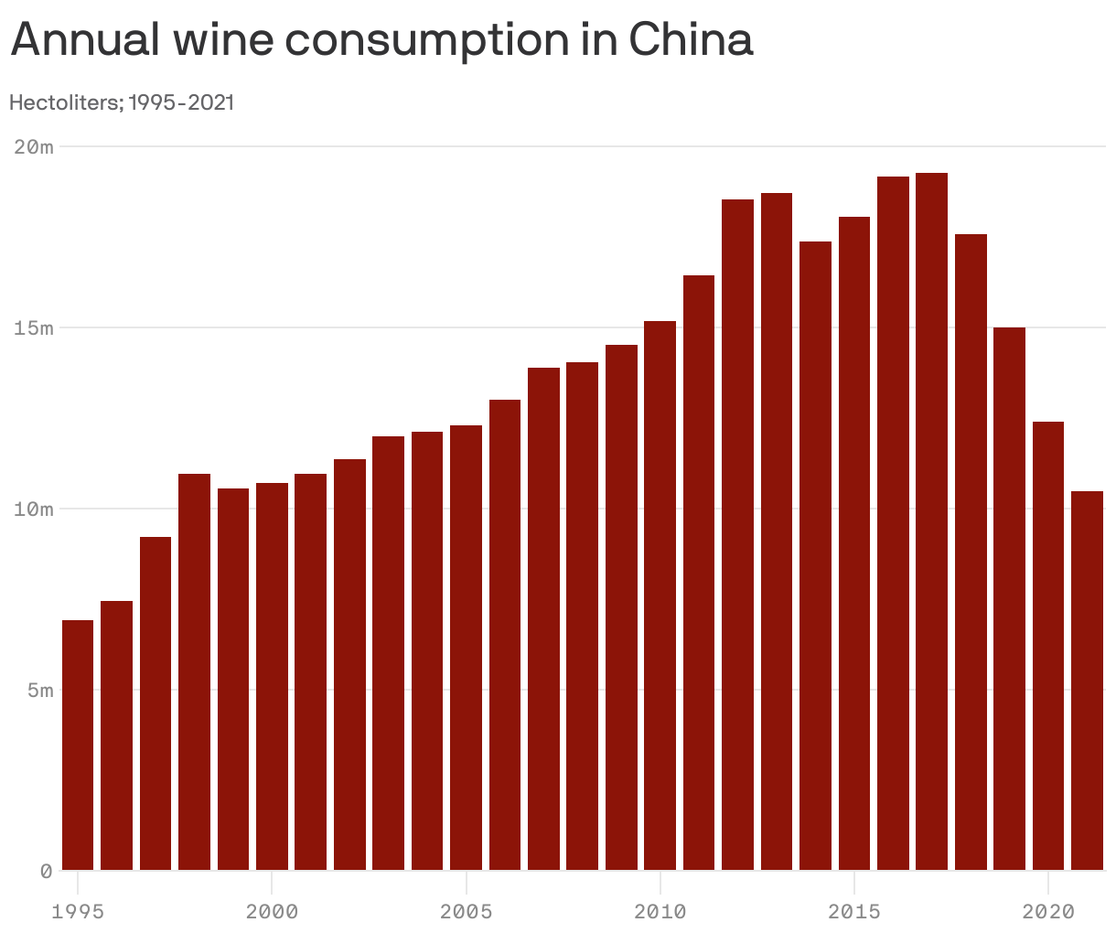



No comments:
Post a Comment